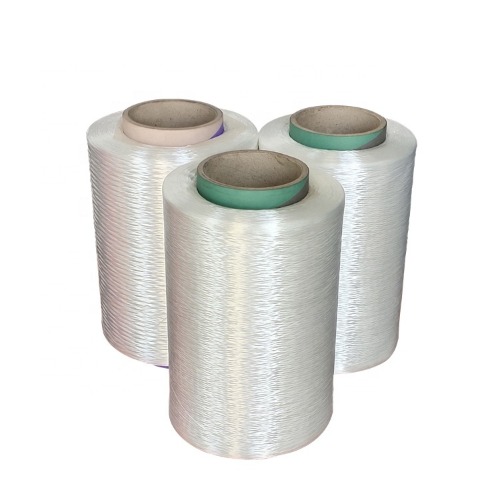The Exceptional Performance Analysis of 1100dtex/336F High Modulus Low Shrinkage Industrial Yarn
The 1100dtex/336F high modulus low shrinkage industrial yarn represents a pinnacle of specialty fiber technology, demonstrating an unparalleled combination of properties that make it an indispensable material across numerous industrial sectors. Its high modulus indicates a superior ability to resist deformation and maintain rigidity under tensile stress, a characteristic that is absolutely critical for high-strength applications. Concurrently, its remarkably low shrinkage ensures that the material’s dimensional stability is maintained even in high-temperature or high-load environments, effectively preventing performance degradation that would otherwise result from thermal expansion and contraction. It is this unique synergy of core properties that positions this industrial yarn as a fundamental component in modern manufacturing, particularly in fields where material performance requirements are exceptionally stringent.
The Critical Role of Industrial Yarn in the Production of Cord Fabric
Industrial yarn serves as the fundamental skeletal structure within cord fabric production. As a reinforcing layer in composite materials, the performance of the cord fabric directly dictates the strength, durability, and safety of the final product. The 1100dtex/336F industrial yarn, with its superior strength, high modulus, and excellent fatigue resistance, emerges as the quintessential choice for manufacturing high-performance cord fabric. It provides a robust internal support system, enabling the fabric to withstand extreme stress without fracturing or deforming. When this yarn is integrated with matrix materials like rubber, it forms a structurally stable and highly reliable composite that is widely utilized in tires, conveyor belts, and various rubber products, offering a solid foundation for the overall performance of the finished goods.
Innovative Applications of 1100dtex/336F Industrial Yarn in Tire Carcass Materials
The innovative application of 1100dtex/336F industrial yarn in tire carcass materials is a prime illustration of its immense value. Modern automotive tires must endure significant impact and friction from the road, all while maintaining structural integrity during high-speed rotation and under elevated temperatures. Leveraging its outstanding high modulus and low shrinkage characteristics, this industrial yarn effectively counteracts the deformation that tires undergo during operation. This not only reduces rolling resistance, thereby improving fuel efficiency, but its exceptional fatigue resistance also ensures that the tire retains its structural integrity and safety even after extensive use. The adoption of this material not only dramatically enhances a tire’s load-bearing capacity and lifespan but also provides a safer and more reliable driving experience for consumers.
How High Modulus and Low Shrinkage Characteristics Boost Product Durability
The secret to this industrial yarn’s ability to enhance product durability lies in its dual high modulus and low shrinkage properties. Under dynamic loading, the high modulus guarantees that the material’s structure won’t undergo excessive deformation, thereby minimizing the microscopic damage caused by stress concentration. The low shrinkage, on the other hand, prevents the material from developing internal stress due to temperature fluctuations, which in turn averts issues like structural cracking or delamination. The perfect combination of these two characteristics allows products built with this yarn to maintain long-term performance stability and reliability across a wide range of harsh environments. This significantly extends the product’s service life, reduces maintenance costs, and delivers substantial value to the customer.
The Production Process and Quality Control of Industrial Yarn
The manufacturing process for this type of industrial yarn is a highly precise engineering endeavor, where every step, from the selection of raw materials to the final formation of the product, is subject to rigorous quality control. Manufacturers typically employ advanced spinning and post-processing techniques to ensure the yarn achieves its desired physical and chemical properties. For instance, precise control over spinning speed and draw ratio is essential for regulating the yarn’s crystallinity and orientation, which are key to achieving high modulus. Similarly, a specialized heat-setting process is used to minimize the yarn’s shrinkage in thermal environments. Every single batch of the product must undergo stringent performance tests—including tensile strength, elongation at break, and heat shrinkage—to ensure it meets the demanding standards of its industrial applications.

Performance Comparison with Conventional Industrial Yarns
When compared to conventional industrial yarns, the 1100dtex/336F industrial yarn exhibits a clear performance advantage. While standard yarns may offer acceptable tensile strength or fatigue resistance, they often fall short in high modulus and low shrinkage. For example, ordinary polyester industrial yarns tend to shrink noticeably at high temperatures, leading to dimensional instability in the final product and compromising its lifespan and safety. This high modulus low shrinkage yarn, however, overcomes these traditional material shortcomings. Its superior combination of properties makes it the preferred choice for applications that demand higher levels of stability, durability, and safety. This leap in performance is not merely a technological advancement in materials but a revolutionary improvement for downstream products.






